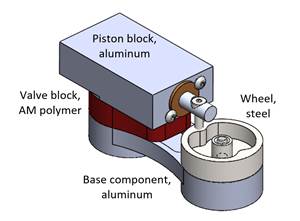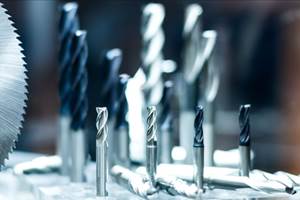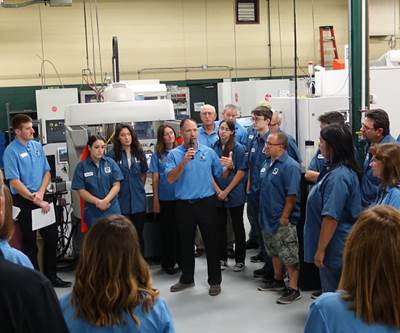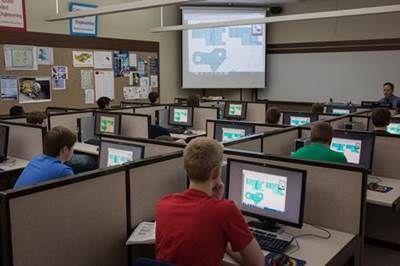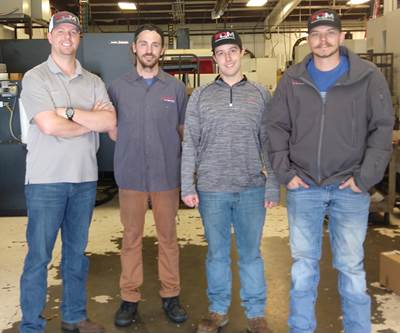Is Gen Z the Answer to the Skills Gap?
There are signs this generation could be. But it might take effort on your part presenting your shop’s capabilities and career opportunities in different ways.
Share




At the National Tooling and Machining Association (NTMA) fall conference last October, discussions relative to Generation Z gave me some hope that the years-long manufacturing skills gap might soon narrow as this generation starts entering the workforce. However, it won’t happen without shops like yours making an enticing effort.
During the NTMA event, select results from the 2019 Manufacturing Index survey conducted by lean execution software provider Leading2Lean were cited. This annual survey was developed to gage the perception of manufacturing in the United States. Results showed that one third of those in Generation Z (aged 18 to 22) have had a counselor, teacher or mentor suggest that they consider a manufacturing career (compared to 18% of surveyed Millennials). In addition, 54% of those in Generation Z understand that the country faces a skilled labor shortage. But while 56% of them say they would consider a career in a tech industry, only 27% say they’d consider a career in manufacturing.
If a modern machine shop doesn’t scream “tech,” then I don’t know what does.
If a modern machine shop doesn’t scream “tech,” then I don’t know what does. This means the machining industry’s biggest challenge is flipping the script — more aptly describing what today’s machine shops are all about. Computers, software, programming, design, automation…they’re tech through and through.
So how do you do that? How do you turn prospects into viable, trainable employees? One is to “open your doors,” a suggestion Mike Griffith, president of Major Tool & Machine in Indianapolis, made at the event. Major Tool did this for October’s Manufacturing Day, when it hosted 850 local students during a two-day program that included 23 educational and industry partners. (That said, it hosts students on similar company tours throughout the year.)
“Open your doors!” — MIKE GRIFFITH, Major Tool & Machine president
Not only does that enable Major Tool to showcase its technology and advanced processes, but it also gives the shop a chance to let its company culture shine through, which can help boost its chances of enticing young people to apply there. But having multiple partners share its space exposes students to broad manufacturing concepts, too. In that respect, tours are not all about Major Tool, Mr. Griffith notes, and he says it doesn’t take all that much effort to pull them off.
A second is to reach out to local schools. Perhaps you’ve done this in the past with limited success, but their mindsets about manufacturing are beginning to change. Today’s school administrators and teachers are more likely to “get it.” This is what Scott Covert, training coordinator for the Penn United Technologies manufacturing company in Cabot, Pennsylvania, found when he pitched his pre-apprenticeship program idea to Dr. Brian Slamecka, assistant superintendent for the Butler Area School District just north of Pittsburgh. It didn’t take long for Dr. Slamecka to get on board, Mr. Covert notes.
The pre-apprenticeship idea was borne after Mr. Covert attended a business and educator meeting and realized that the burden was on the industry to help educate the educators about manufacturing career opportunities and the high-tech nature of the work manufacturers do. “Who knows better than we do about what we want (and need) kids to know when they graduate from high school?” he asks.
In short, the program combines online NTMA-U courses students take at school with monthly visits to Penn United to apply what they’ve learned. The online courses introduce students to very basic skills, including blueprint reading, use of hand gages, and what’s involved in milling, turning, grinding and so on. However, those are talents that manufacturers can build upon, essentially shortening training time as prospects are also introduced to the specific needs of and processes performed at their individual companies.
Another idea is revamping your job descriptions, which I suggested in a previous One-Off column. In that column, I highlighted a shop that now lists everyday duties such as working with one’s hands, crafting new products, using CAD software and so on in its job descriptions. The shop also made sure to describe what it feels are attractive traits beyond vacation pay and a healthcare plan, including a four-day workweek, flexible schedules and a fun environment. As a result, it is now attracting younger, more enthusiastic applicants.
This all gets to effective communication. Shops must do what they can to get the word out to young people such as those in Generation Z, parents of young people and today’s educators. As Mr. Covert mentions, you have three choices: You can be proactive and think outside the box and create a program that’s going to help your company engage those youth, you can reactive and try to replicate what other companies are doing, or you can be inactive and watch others take prospective employees from you. Which will it be?
Related Content
Manufacturing Madness: Colleges Vie for Machining Title (Includes Video)
The first annual SEC Machining Competition highlighted students studying for careers in machining, as well as the need to rebuild a domestic manufacturing workforce.
Read MoreHow I Made It: Amy Skrzypczak, CNC Machinist, Westminster Tool
At just 28 years old, Amy Skrzypczak is already logging her ninth year as a CNC machinist. While during high school Skrzypczak may not have guessed that she’d soon be running an electrical discharge machining (EDM) department, after attending her local community college she found a home among the “misfits” at Westminster Tool. Today, she oversees the company’s wire EDM operations and feels grateful to have avoided more well-worn career paths.
Read MoreSolve Worker Shortages With ACE Workforce Development
The America’s Cutting Edge (ACE) program is addressing the current shortage in trained and available workers by offering no-cost online and in-person training opportunities in CNC machining and metrology.
Read MoreAddressing the Manufacturing Labor Shortage Needs to Start Here
Student-run businesses focused on technical training for the trades are taking root across the U.S. Can we — should we — leverage their regional successes into a nationwide platform?
Read MoreRead Next
For This Mold Shop, the Key to Closing the Skills Gap is Emotional Intelligence
Thanks to a culture change founded on a commitment to emotional intelligence, this mold supplier solved its skilled labor problem and increased throughput per employee.
Read MoreVideo: What Is It Like to Study Manufacturing?
A student project team at a community college illustrates the learning and experience involved in preparing for a manufacturing career.
Read MoreAre Your CNC Machinist Job Descriptions Outdated?
Traditional machine shop job descriptions might not draw interest from the talented, young people your shop needs to grow.
Read More


























